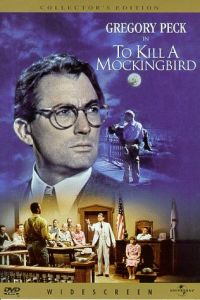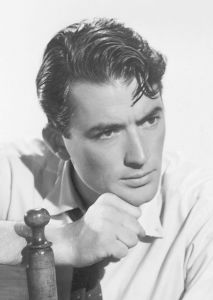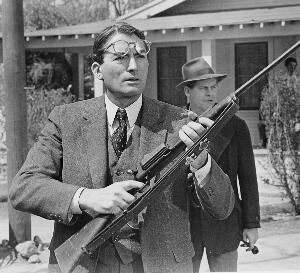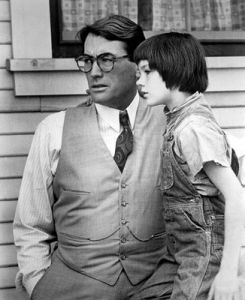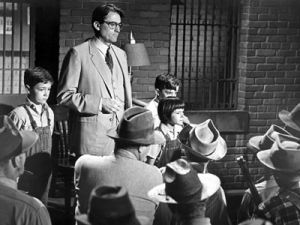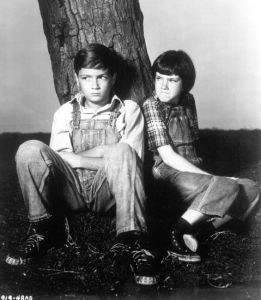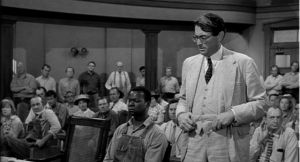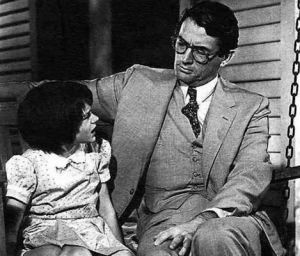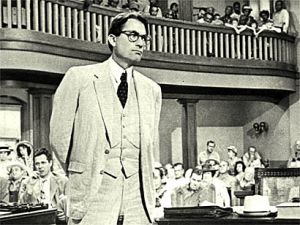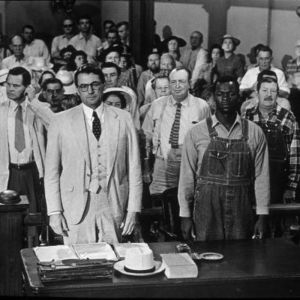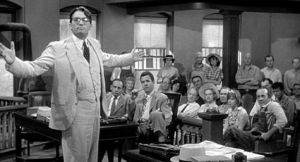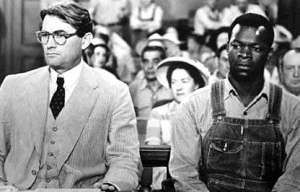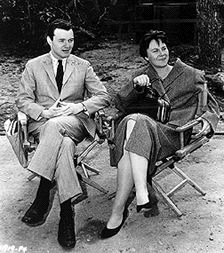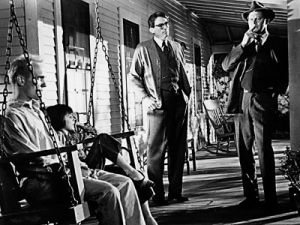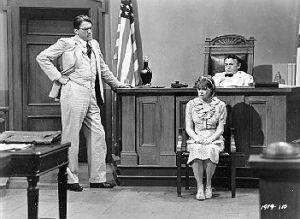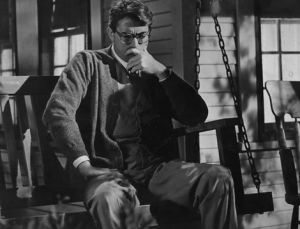To Kill a Mockingbird 杀死一只知更鸟
To Kill a Mockingbird (杀死一只知更鸟) is a 1962 American drama film adaptation of Harper Lee's novel of the same name. This autobiographical novel was translated to film by Horton Foote and the producer Alan J. Pakula and director Robert Mulligan. Set a small Alabama town in the 1930s, the story focuses on scrupulously honest, highly respected lawyer Atticus Finch. This film marks the film debut of Robert Duvall, William Windom, and Alice Ghostley.
Directed by: Robert Mulligan
Produced by Alan J. Pakula
Written by: Horton Foote
Narrated by: Kim Stanley
Music by: Elmer Bernstein
Cinematography: Russell Harlan
Editing by: Aaron Stell
Distributed by: Universal Pictures
Release date: December 25, 1962
Running time: 128 minutes
Country: United States
Language: English
Genre: Crime Drama
Color: Black and White
Gregory Peck as Atticus Finch
Phillip Alford as Jeremy Atticus "Jem" Finch
Robert Duvall as Arthur "Boo" Radley
John Megna as Charles Baker "Dill" Harris
Alice Ghostley as Aunt Stephanie Crawford
Brock Peters as Tom Robinson
Frank Overton as Sheriff Heck Tate
Rosemary Murphy as Miss Maudie Atkinson
Ruth White as Mrs. Henry Lafayette Dubose
Estelle Evans as Calpurnia "Cal"
Mary Badham as Jean Louise "Scout" Finch
Richard Hale as Nathan Radley
James Anderson as Robert E. Lee "Bob" Ewell
Collin Wilcox as Mayella Violet Ewell
William Windom as Mr. Gilmer
Paul Fix as Judge Taylor
David Crawford as David Robinson
Crahan Denton as Walter Cunningham, Sr.
The story is told through the eyes of six-year-old Scout (Mary Badham), feisty young lady who lives in a small Alabama town with her older brother Jem (Philip Alford) and her father. A man named Atticus Finch (Gregory Peck), who is a widower. There has been an arrest of a black man, Tom Robinson (Brock Peters) accused of raping a white woman named Maybella Ewell (Collin Wilcox). The town is up in arms and there's talk of lynching a "nigger' who's obviously guilty.
At the preliminary hearing, someone needs to be appointed to defend Tom and Atticus is selected. The town gets ready for a quick and speedy trial. As the trial gets nearer, some of the men in town decide to take matters by taking Tom out of the jail and hanging him.
Sheriff Tate (Frank Overton) comes to Atticus and tells him of the impending action. Atticus takes a chair, a lamp and a bood down to the jail to sit up all night to guard Tom. But the drunken mob comes any way and they tell Atticus to get out of the way and let them get on with it. Scott and Jem and their cousin Dill (John Mosna) are hiding in the shadows during this interaction between Atticus and the mob. Scout comes out and says "Hey" to Mr. Cunningham, a member of the mob. Scout says, "I said hey Mr. Cunningham," again. And it's her presence that defuses the situation.
At various times throughout the movie the children discuss the "crazy" man who lives down the block. They think "Boo" Radley (Robert Duvall) comes out at night and gets little kids and animals. But Boo is to play an interesting part in the story later. Another interesting scene is when the Finch housekeeper Maudie (Rosemary Murphy) sees a dog coming down the street and it's acting very strangly. She tells someone to go fetch Mr. Finch and the Sheriff. They come and the Sheriff has a rifle. It seems the dog is rabid and someone needs to shoot it before it gets too close. The Sheriff hands the gun to Atticus and says he would prefer if Atticus took the shot. The children because they have no idea about this side of their father. The Sheriff says their dad is the best shot in three counties. Sure enough, Atticus takes down the dog in one shot. Another interesting side story in the picture in strange happenings with a tree on the block. Scout begins to find unusual items left in a knot hole in the tree, like string and a knife and other stuff.
The trial begins and it doesn't look good. The first witness is Bob Ewell, one of the towns no account white folks who don't work much and he's the father of Maybella, the alledgely victim in the case. Bob testifies how he comes home and sees Tom going out the side door and Maybella is all beat up and black and blue on the left side of her face. Then Maybella gets on the stand and testifies that she saw Tom coming by and tells him to come up to the house and break up a chifforobe and she'll give him a nickel. She says that when she goes inside to get the nickel, Tom comes up behind her and grabs her and when she screams, he hits her on the left side of his face. About that time her daddy comes up to the house and Tom runs out the side door.
Atticus asks her again about how Tom held her and hit her and is she sure. She says over and over yes I'm sure. Now Atticus calls Tom to the stand. Atticus asks Tom to tell his version. Tom says he was walking by the house and Miss Maybella asked him to come in the yard and break up the chifforobe. Tom says she was always asking to do this little chore or that one. After he did the chore, he says that Maybella asks him to come inside while she gets his nickel. Tom freezes at this point, but Atticus gets him to go on. Tom begins to sweat, he says that as he took the quarter, Maybella grabs him and puts her arms around him. At this point Bob Ewell is standing at the door and hollers at Maybella. Tom says he took off.
Atticus asks Tom to hold something in his right hand. Tom says now Mr. Finch, he know I can't do that ever since my arm got crushed in that accident. I have to do everything with my left hand. So Atticus points out if Tome struck the bruises would be on the left side of her face, not the right. Atticus recalls Ewell to the stand and asks him if he's left handed or right handed. Why right says Ewell. Atticus says so if you struck someone they would have bruises on the right side of her face. Despite the obvious evidence presented by Atticus. The all white jury in an Alabama town in 1932 convicts Tom. And no one is the winner.
Later in the year, Scout and Jem are going to a Halloween party. Scout is wearing a costume made out to be a ham. She could see out of the costume. They decided to take a short cut through the woods. Part of the way the two children are attacked by someone, there's a shuffle and Scout is knocked down. The next thing she remembers is being in bed at home. Her dad is there and all is well except she has a broken arm. She suddenly realizes someone is standing behind the door of her room in the shadows. She says, "Hey Boo." It's Boo Radley and he saved Jem and Scout from being killed.
Horton Foote was initially reluctant to adapt the novel into a screenplay as he felt that he would be unable to do it justice. The film generally focuses on the mystery surrounding Boo Radley and the trial of Tom Robinson, whereas the novel features these as episodes in Scout's childhood development. In addition, several smaller details were changed.
The film shows Jem finding a medal in the hollow of the tree in front of the Radley house. In the novel, Scout found the first treasure. Also in the plot with Jem and the tree, in the novel, he and Scout do not see Mr. Nathan Radley cement the tree, whereas in the film, they do. In the novel, Jem goes back to the Radley house to get his pants later that night. In the movie, he goes back immediately after he loses them. Also, in the novel, Mr. Nathan Radley comes out with the shotgun when he finds them in the yard. In the film, he comes out with it when Jem goes back. In the novel, Calpurnia makes an appearance at the trial of Tom Robinson. In the film, she doesn't. In the novel, Tom was said to have been shot, "about seventeen times". In the film, he was apparently only shot once, as Atticus doesn't mention this fact. However, he may not have wished to mention this rumor to his children. In the novel Tom was shot by prison guards as he ran toward the fence. In the film he was shot by deputies taking him to prison. The prison guards shot to kill; the deputies shot to stop him. In the novel, the trial is held in summer when Dill is still in town. In the film, it's held in fall after Dill goes back to Meridian. In the novel, the Finch children go with Calpurnia to her church while their father is out of town. In the movie, this is omitted.
In the novel, Mrs. Dubose is the one who calls Atticus a "nigger-lover" in the presence of Scout and Jem. In the film, Bob Ewell is the one who calls him this and says it directly to his face. Jem is the one of the two children who hears Atticus called this. Scout is present, but she does not hear because she is asleep. In the novel, Dill ran from Meridian to the Finches because he hates his new father. This is omitted in the film. In the novel, Boo Radley's only line is "Will you take me home?" which he says to Scout in the final chapter. In the film, this line is left out. In the film Atticus allows Jem to come with him to the Robinson home to inform them of Tom's death. In the novel, this job is given to Calpurnia, although Jem and Dill are with them due to the fact that Jem was teaching Dill to swim and were reluctantly picked up by Atticus on the way over to the Robinson home.
Although Gregory Peck's inspirational performance as Atticus Finch turned out to be a perfect highlight to his long career, Rock Hudson was actually the studio's first choice for the role. James Stewart was also offered the part, but told the producers he believed the script was "too liberal", and feared the film would be controversial.
After being offered the part of Atticus Finch, Gregory Peck read Harper Lee's novel in one sitting and called Robert Mulligan immediately after to say that he would play the part. Phillip Alford, who played the role of Jem, did not initially want to audition for the part. However, when his mother informed him that he would miss a half day of school, he quickly changed his mind. Additionally, he became upset during the filming of the scene at the breakfast table, when Mary Badham, who played Scout, had trouble performing the scene properly. By way of retaliating, during the scene where Jem rolls Scout in a tire, he intentionally rolled the tire toward an equipment truck.
The courtroom is a recreation of the interior of the Monroe County Courthouse in Monroeville, Alabama, Harper Lee's hometown. Prior to filming, production designers traveled to Monroeville, took photographs and measurements, and created a near duplicate on soundstages at Universal Studios. Art directors Alexander Golitzen and Henry Bumstead had an entire reconstruction of the fictional town of Maycomb, Alabama, built on the Universal backlot at a cost of $225,000. The set contained more than 30 buildings. It would have cost at least $100,000 more had Golitzen and Bumstead not learned of some Southern-style housing about to be demolished to make way for a new Los Angeles freeway. They bought a dozen of them and had them brought to the studio.
Brock Peters started to cry while shooting the testifying scene, without rehearsing it this way, and Gregory Peck said that he had to look past him, instead of looking him in the eye, without choking up himself. The first scene that Gregory Peck shot showed him returning home from his character's law office while his children ran to greet him. Harper Lee was a guest on the set that day, and Peck noticed her crying after the scene was filmed. "Why are you crying?" Peck asked. Peck had looked just like her late father, the model for Atticus, Lee explained; Peck even had a little round pot belly like her father's. "That's not a pot belly, Harper," Peck told her, "That's great acting."
Jem: There goes the meanest man that ever took a breath of life.
Dill Harris: Why is he the meanest man?
Jem: Well, for one thing, he has a boy named Boo that he keeps chained to a bed in the house over yonder. Boo only comes out at night when you're asleep and it's pitch-dark. When you wake up at night, you can hear him. Once I heard him scratchin' on our screen door, but he was gone by the time Atticus got there.
Dill Harris: I wonder what he does in there? I wonder what he looks like?
Jem: Well, judgin' from his tracks, he's about six and a half feet tall. He eats raw squirrels and all the cats he can catch. There's a long, jagged scar that runs all the way across his face. His teeth are yella and rotten. His eyes are popped. And he drools most of the time.
Atticus Finch: There are some things that you're not old enough to understand just yet. There's been some high talk around town to the effect that I shouldn't do much about defending this man.
Scout: If you shouldn't be defending him, then why are you doing it?
Atticus Finch: For a number of reasons. The main one is that if I didn't, I couldn't hold my head up in town. I couldn't even tell you or Jem not to do somethin' again.
Atticus Finch: You're gonna hear some ugly talk about this in school. But I want you to promise me one thing: That you won't get into fights over it, no matter what they say to you.
While Atticus gets his papers together in the courtroom after the verdict you see a water glass next to the pitcher on the judge's desk. In the next shot, as he walks out, there is no glass, just the pitcher.
Directly after the scene where Jem and Scout are attacked while walking home through the woods, as Scout runs after the figure carrying Jem home, the trees and scenery can be seen through Scout in a ghostly fashion as if they were not originally part of the scene and were added afterward.
After speaking with Mrs. Dubose, Scout, Jem and Dill walk with Atticus towards the Finch home. When the camera angle shifts, Dill is no longer walking with them, but is all the way on the other side of the house walking towards them.
"He (Gregory Peck) called back immediately. No maybes. The fit was among the most natural things about a most natural film. I must say the man and the character he played were not unalike."
—Alan J. Pakula
"Hardly a day passes that I don't think how lucky I was to be cast in that film. I recently sat at a dinner next to a woman who saw it when she was 14 years old, and she said it changed her life. I hear things like that all the time."
—Gregory Peck
"It certainly is one of my proudest achievements in life, one of the happiest participations in film or theater I have experienced."
—Brock Peters (as Tom Robinson)
It is also far from the first film to explore the experiences of children and their own personal growth, but To Kill a Mockingbird stands out because of its sheer honesty and natural performances by the child actors portraying these rich characters.
The writing here is so beautiful, so lyric, so poetic. The Harper Lee-based screenplay captures wonderfully a time and a place that are absolutely real--where big brothers could solve the universe's problems in an instant and all the treasures of the world could be contained in a cigar box.
Oscar(Academy Awards, USA)
Best Actress in a Supporting Role, Mary Badham
Best Cinematography, Black-and-White, Russell Harlan
Best Director, Robert Mulligan
Best Music, Score - Substantially Original, Elmer Bernstein
Best Picture, Alan J. Pakula
BAFTA Awards
Best Film from any Source
Best Foreign Actor, Gregory Peck
Golden Globes, USA
Best Motion Picture - Drama
Best Motion Picture Director, Robert Mulligan
Oscar(Academy Awards, USA)
Best Actor in a Leading Role, Gregory Peck
Best Art Direction-Set Decoration, Black-and-White, Alexander Golitzen, Henry Bumstead, Oliver Emert
Best Writing, Screenplay Based on Material from Another Medium, Horton Foote
Golden Globes, USA
Best Film Promoting International Understanding
Best Motion Picture Actor - Drama, Gregory Peck
Best Motion Picture Score, Elmer Bernstein
Writers Guild of America, USA
Best Written American Drama, Horton Foote
No. 1 on AFI's list of best courtroom films
No. 24 on the American Film Institute's 10th anniversary list of the greatest American movies of all time
Atticus Finch as the greatest movie hero of the 20th century on AFI
附件列表
词条内容仅供参考,如果您需要解决具体问题
(尤其在法律、医学等领域),建议您咨询相关领域专业人士。
如果您认为本词条还有待完善,请 编辑
上一篇 2010.3.11公布2009.11月英语六级口语成绩 下一篇

